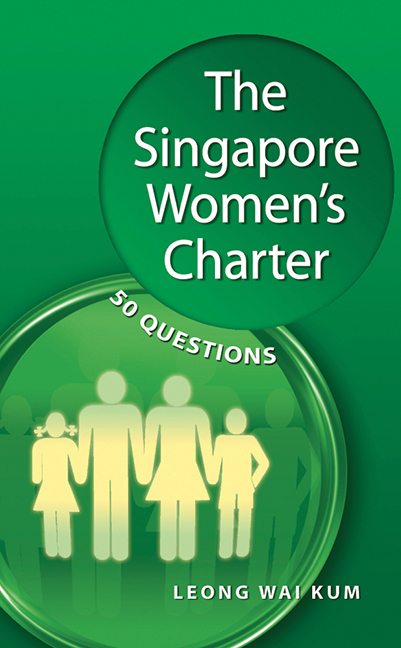Book contents
- Frontmatter
- Contents
- List of Questions
- Foreword
- Preface
- Part I What is the Women's Charter?
- Part II Marriage
- Part III Regulation of Husband-Wife Relationship
- Part IV Regulation of Parent-Child Relationship
- Part V Violence in the Family
- Part VI Divorce and the Process
- Part VII Maintenance
- Part VIII Division of Matrimonial Assets
- Part IX Muslims
- Epilogue
- References
- Index
- About the Author
Part VII - Maintenance
Published online by Cambridge University Press: 21 October 2015
- Frontmatter
- Contents
- List of Questions
- Foreword
- Preface
- Part I What is the Women's Charter?
- Part II Marriage
- Part III Regulation of Husband-Wife Relationship
- Part IV Regulation of Parent-Child Relationship
- Part V Violence in the Family
- Part VI Divorce and the Process
- Part VII Maintenance
- Part VIII Division of Matrimonial Assets
- Part IX Muslims
- Epilogue
- References
- Index
- About the Author
Summary
Who owes the duty to provide reasonable maintenance to a child?
Parents primarily, other adults secondarily
The Women's Charter imposes the duty to provide maintenance to a child dependent on financial support primarily on the parents. Where a parent or both parents are proven to have failed to discharge their responsibility when they are able to do so (discussed in Question 17 above), the Family Court is empowered to make an order to the parent(s) to provide a specified amount for the child's reasonable maintenance.
If, however, the parents are not discharging their duty and, instead, some adult has voluntarily assumed the responsibility of providing this financial support by accepting the dependent child as a member of his or her own family, the Family Court is empowered to order this adult to continue to provide a specified amount for the child's reasonable maintenance. Where the parents of a child can be held responsible for his or her financial needs, there is no reason for the Family Court to impose this responsibility on any other adult. Where the parents fail, the court may turn to the adult who has accepted the child as a member of his or her family.
The Family Court first enforces parental responsibility and will only impose the extension of this on an adult who is not a parent of the child where it is not possible to hold the parents to their responsibility.
Reasonable maintenance
The Women's Charter directs the Family Court to take all relevant factors into consideration in deciding how much maintenance is reasonable for the particular child. These include the financial needs of the child, the income and earning capacity of the person to be ordered to pay, any disability of the child that may raise the particular child's needs, the standard of living enjoyed by the child up to the time of the application, and the manner in which the child is expected to be educated or trained for employment.
Age
Maintenance is normally ordered for a child until he or she reaches the age of twenty-one years. The Women's Charter exceptionally allows for maintenance to be ordered beyond the age of twenty-one where there are good reasons for it.
- Type
- Chapter
- Information
- The Singapore Women's Charter50 Questions, pp. 85 - 100Publisher: ISEAS–Yusof Ishak InstitutePrint publication year: 2011



